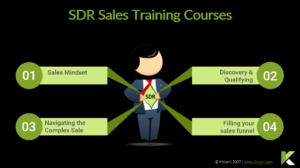When comparing web-based and traditional sales training methods, it’s essential to consider the unique benefits and challenges of each approach. Traditional classroom-based sales training often involves instructor-led sessions, role play actors, and live interaction, which can be highly effective for developing essential skills and creating a sense of community among participants. However, it can be costly, time-consuming, and less flexible in terms of scheduling and location.
Web-Based Sales Training Advantages
1. Flexibility and Accessibility: Online training courses allow sales reps to learn at their own pace and schedule, making it easier to fit into busy work routines. This flexibility supports continuous improvement and ensures that training is accessible to remote teams and field sales personnel alike.
2. Cost-Effectiveness: Virtual courses typically incur lower costs compared to traditional training programs, eliminating the need for travel, accommodation, and physical materials. Organizations can reinvest these savings into other areas, such as customized case studies or additional sales resources.
3. Scalability: Web-based training can easily scale to accommodate large numbers of participants across various locations, ensuring that all team members receive consistent training regardless of geographical constraints.
4. Engaging and Interactive Content: Modern online sales training platforms often incorporate interactive elements such as quizzes, videos, and practical simulations to keep participants engaged. Tools like role playing scenarios and pre call planning exercises help to reinforce learning and improve sales skills.
Traditional Sales Training Advantages
1. Personal Interaction and Networking: In-person training sessions foster direct communication, allowing sales reps to build rapport with instructors and peers. This environment is conducive to masterful sales conversations and immediate feedback during role plays and practical exercises.
2. Immediate Clarification and Support: Real-time interaction with instructors allows for immediate clarification of doubts and personalized feedback, which can enhance learning outcomes and help participants understand complex sales concepts more effectively.
3. Hands-On Practice: Traditional training often includes hands-on practice sessions, such as negotiation role plays and objection handling, which are critical for developing necessary skills and building confidence in real-world sales scenarios.
Integrating Both Approaches for Optimal Results
Many organizations find that a blended approach, combining web-based and traditional training methods, offers the best of both worlds. By incorporating online modules for theoretical learning and in-person workshops for practical application, businesses can create a comprehensive sales training program that maximizes learning outcomes.
For instance, Klozers utilize online platforms for foundational training and then schedule periodic in-person sessions to focus on advanced topics like value based sales training or key account management. This hybrid approach ensures that sales reps are well-equipped to lead masterful sales conversations and achieve their sales goals.
Ultimately, the choice between web-based and traditional sales training methods depends on various factors, including the specific needs of the sales team, budget constraints, and organizational goals. By carefully evaluating these factors, businesses can implement a training strategy that not only develops skills but also drives future growth and improves overall sales performance.












